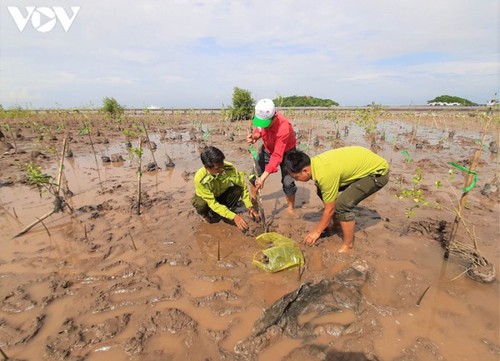 Soc Trang province consolidates coastal areas to prevent erosion Soc Trang province consolidates coastal areas to prevent erosion |
The right to live in a healthy environment is important because it affects people’s quality of life and, like per capita income and social security, is a measure of a country’s standard of living.
The international community acknowledges that the right to live in a healthy environment is a basic right and the aim of environmental protection. This right has been explicitly included in the laws and policies of many countries.
Vietnam, as a signatory of many UN documents on the environment and human rights, has made the right to live in a healthy environment a legal principle and an element of environmental law.
The preface of the 1993 Law on Environmental Protection says: “Improving the state management efficiency and responsibility of administrations at all levels, state agencies, social and economic organizations and people’s armed forces units in environmental protection aims to protect people’s lives and ensure a healthy environment for people in order to serve national development and contribute to environmental protection regionally and globally.”
This principle is mentioned indirectly in Article 2, Clause 3 of the 2005 Law on Environmental Protection, which says “Environmental protection is the cause of the whole society, and it is the right and responsibility of state agencies, organizations, and individual households.”
In the 2014 Law on Environmental Protection, this principle is stipulated in Article 2, Clause 4, which says: “Environmental protection is harmoniously linked with economic development, social security, child rights protection, gender promotion and development, biodiversity conservation, and climate change response in order to ensure that everyone lives in a healthy environment.”
This is not just a principle but the purpose of the Law on Environment and other legal documents concerning environment.
Ensuring human rights in Vietnamese policies and laws on climate change is a matter of localizing international climate change treaties to which Vietnam is a signatory. The laws and policies stipulate a responsibility for taking climate change response actions in production, business, and service activities of organizations, individuals, and state agencies.
Ensuring human rights in policies and laws on climate change also means ensuring the right to access information about the environment. The 2014 Law on Environmental Protection stipulates that “the community has the right to provide and be provided with information about climate change, except for information listed by the state as confidential”, and “climate change management agencies are responsible for providing information, organizing activities to improve public awareness, and creating favorable conditions for the community to participate in climate change response activities.”
Under Vietnamese law, there are two ways to give the public access to information about the environment and climate change: state agencies and businesses can make information that is relevant under the regulations publicly accessible to all; and people can ask state agencies and businesses, as well as political, social, and occupational organizations, for specific information about the environment and climate change.
Ensuring human rights in Vietnamese laws and policies on the environment includes regulations concerning environmental planning, which must be compatible to the national strategy on environmental protection for sustainable development, the plan on land use, and strategies and master plans for socio-economic development, national defense, and national security.
Ensuring the right to live in a healthy environment is also a part of building strategies and plans for investment projects.
Vietnamese laws and policies on climate change stipulate that ensuring human rights must be a part of greenhouse gas emission management, energy collection from waste, environment-friendly production and consumption, exploitation of natural resources, and technology development and application.